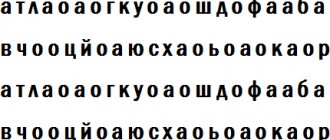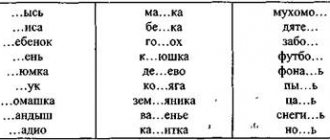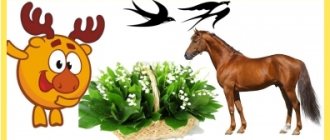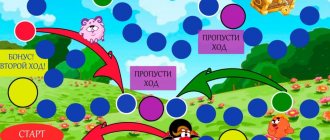Lesson on the topic: Differentiation of sounds Ch-Sh
Summary of a speech therapy lesson, differentiation of sounds Ch-Sh
Topic: Ch-Sh differentiation (lesson 1)
3-4 grades of a special (correctional) boarding school of the VIII type.
Goal: 1. To develop the ability to differentiate the sounds Ch and Sh;
2. Correlate them with the letters Ch, Sh; 3. Develop auditory and speech attention; 4. Perform sound-letter analysis and synthesis of words.
Materials for the lesson: subject pictures, handout cards, colored pencils, notebooks, pens, speech material.
Progress of the lesson.
1. Organizational moment.
Using a thread of beads, lay out the letters: Ch and Sh.
2. Main part.
1. Introduction to the topic.
Listen to the words and name the consonant at the beginning of the word. Words: Tea, bowl, check, forelock, shuttle.. Wardrobe, ball, noise, school, fur coat, washer. Pay attention to the difference in their pronunciation: When pronouncing the sound Ch, the tip of the tongue closes with the upper alveoli (tubercles), then the stop explodes. When we pronounce the sound Ш, the cup-shaped tongue rises up, the tip of the tongue does not close. We remind you: Ch and Sh are consonants, unvoiced sounds. If you put your palm to the neck, there is no voice (vocal cords trembling). H – soft, Ш – hard.
2. Correlating sounds with the letters Ch, Sh.
• Draw these letters in the air, on the palm of your hand and on the palm of others.
• Work on handout cards (roll number 1): look at your task cards, identify the first sound in the names of the pictures and label it with a letter.
• How many letters Ch and Sh do you think there are here (card No. 1)?
• Underline the letter C with one stroke, and Ш with two:
Ch w s w C ch w Sh s c ch Ch w C C ch w Ch Sh Sh Sh i ch c ch C Ch sh ch c Sh Shch Shch Ch c ch Z sh z
3. Differentiation of sounds at the syllable level.
a) Reading syllable rows (from the board): Cha - sha Cho - sho Chu - shu Chi - shi Asha - acha Osho - ocho Ushi - teach, etc.
b) Dictation of syllables: Cha, sha, chu, shu, cho, sho, chta, shto, chle, shlee, chka, shka, etc.
c) Game "Echo".
Children are asked to imagine that they are in a dense forest. There is silence all around, and only the echo repeats every sound. The adult pronounces the syllables, and the child needs to repeat them correctly:
Cha-sha, sha-cha, cha-sha-cha, sha-cha-sha, cha-sha-sha, cha-sha-cha-sha, sha-cha-cha-sha, sha-cha-sha-cha.
4. Physical exercise.
5. Differentiation of sounds at the word level.
- Selection of subject pictures (with given sounds);
- Determine what sound is in the word Sh or Ch, what is its place in the count (work in the dispensing roller (No. 1)
- Insert the letter H in green, Ш in blue (card No. 2). When writing down words, pronounce them out loud syllable by syllable.
6. Differentiation of sounds at the sentence level.
• Read and repeat the tongue twister.
The teacups, sad and bored, began to jingle and scream. Four turtles have four hatchlings. The baby turtle has turtle boots on his little turtle little feet. 3. Summary of the lesson. What sounds did we work with today? How are these sounds similar? What is the difference?
Topic: Differentiation Ch - Sh (lesson 2)
Objectives of the lesson: 1. develop phonemic awareness;
2. consolidate the ability to differentiate the sounds Ch and Sh in words, sentences, text; 3. enrich vocabulary and grammatical forms of speech;
Materials for the lesson: handout cards, colored pencils, notebooks, pens, speech material.
Progress of the lesson.
1. Organizational moment.
Determine the number of letters Ш and Ш superimposed on each other. "Check yourself". Remember the difference between the sounds Sh and Ch? What techniques will help you distinguish these sounds?
2. Main part.
1. Differentiation of sounds at the word level.
• Write down the first letters of the words (auditory dictation):
Words: garden, shawl, bough, noise, awl, strength, sleigh, hat, chair, storm, bayonet, table.
• Complete the word by adding the syllables CHI or SHI (roll number 2):
2. Differentiation of sounds at the level of phrases.
For the words in the first column, select words from the second column that are suitable in meaning. Write down the resulting phrases. Underline the letters Ch and Sh in different colors (card No. 3 -1).
3. Physical exercise
4. Differentiation of sounds at the sentence level.
• Make up sentences from these words (roll number 3 – notebook entry):
5. Visual-auditory dictation.
The text is written on the board, the letters Ш and Ш are highlighted. The child reads the text, paying attention to the highlighted letters. Speaks them out using self-control techniques. Then the text is closed and the teacher dictates the text. After writing, the text opens, the child checks his work himself, comparing it with the writing on the board (card). Then the teacher checks the dictation.
The baby always has clean palms. Misha loves hot cheesecakes.
3. Summary of the lesson.
What sounds did we work with today? How are these sounds similar? What is the difference?
Application.
Handout cards
Differentiation h - sh in words Training exercises
Task 1. Listen to the words, find the sounds ch, sh and write down the corresponding letters:
a) from the beginning of the word.
Worm, hat, suitcase, box, tea, ball, teapot, school, stockings, pants, watch, joke, reading, hairpin, sleepers, chi-, hundred, clean, stamp, sneeze;
b) from the middle of the word.
Accounting, decide, sieve, respect, target, shout, mistake, pay, absence, mouse, pea, fist, junior, newcomer, pod, good, kids, bitch.
a) at the end of a word.
Doctor, baby, rook, galosh, kalach, ours, crying, yours, hoop, shower, brick, hut, owl.
Task 2. Complete the word by adding syllables:
a) cha, sha
(remember how the syllable
cha is always written):
Ka..., tu..., Ma..., ku..., kry..., meet.... Mi..., paw..., yes..., on..., back.... Pa..., pereda..., fresh..., poro..., otda..., food..., uda...;
b) Chi, shi
(remember how the syllable
shi is always written).
but..;., on..., we..., yes..., u..., tu..., halo..., kala...,, back..., small..., wind..., lands..., gra..., they say..., pi..., dy ..., nor... .
Task 3. Compare the sound and meaning of pairs of words. With each word, verbally come up with a sentence. —
Dasha - dacha; cat - hummock;
cloud—carcass; I twist and crush.
Task 4. Change the words according to the example. Write down:
Illustration: cat - kitty.
frog - ..., coil - ..., edge - ..., shell - ..., cuckoo - ..., baby - ..., hat - .... midge - ..., pillow - ... .
Task 5. Listen to the words. Determine the presence and place of the sounds sh, ch in words. Make diagrams of words. Write the letters sh, h above the corresponding syllable. Under the diagram, write the word syllable by syllable.
Tiny, pad, line, cup, scales, crumb, frog, frog, cat, spiders, midges, toy, tiny, wheat, buckwheat, night.
Task 6. Listen and write down a series of words.
Frog - frog - little frog - frog; cat - cat - feline; tiny - tiny - tiny.
Task 7. Write the words in three lines: in the first - with the letter h, in the second - with the letter - w, in the third - with the letters h, sh.
Stocking, cannon, teapot, scales, fur coat, tire, seagull, car, kidney, stove, midge, mast, tiny, mail, roll, baby, strongman, itchy, crying, chocolate; cat, cup, suitcase.
Task 8. Insert the missing letters sh or ch into the word.
Lap...a, cru...a, ...ahta, st...it, ...ervyak, ...to stomp, ...ugun, ...izh, ko...ka, o...ki, peck..., sweat...i, lu..., brick.,., ...ere-nok, pe...enye, ...tu...ka, ...a...ki, to..e...ka, ...emodan...ik, ...ep...ik, ...a...e...ka, beech...e...ka, ... aini...ek,...ulo...ki, ba...ma...ki,...u...u,...e...ya.
Task 9.
Vocabulary dictations
a) based on the diagram, highlighted letters, h;
b) dividing words into syllables;
c) without relying on the diagram and highlighted letters. (Material from previous assignments is used.)
Differentiation h - sh in sentences Training exercises
Task 1. For the words in the first column, select words from the second column that are suitable in meaning. Write down the resulting phrases. Underline the letters w, h with different pencils.
a) juicy chocolate b) buckwheat handle tiny speck clean pate black pear big man creamy mouse school palms sharpened porridge wide porridge hot cheesecake liver cup milk pencil sensitive stream. Brown hat
Task 2. Complete the sentences with appropriate word combinations. (Previously worked out phrases are used.)
Grandma cooked... (what?). Ripened on the pear tree... (what?). The white cat had one thing... (what?). The baby always has... (what?). Natasha loves... (what?). There is a rustling sound in the corner... (who am I? who?). Fell off the table and broke... (how am I? What?). Flows under the mountain...(what?). Misha put it on his head... (what?).
Task 3. Come up with and write down sentences with phrases.
Milk noodles, liver pate, night rustle, ceramic pot, school pen.
Task 4. Copy the sentences by inserting the missing letters h, w.
Ma...has a new...a...ka. Dad drinks...ah from the pain...oh measles...neva...ah...ki. Babu...ka pe...et vatra...ki. Mi...a loves grief...ie vatra...ki. Grandfather... you... gave your grandfather... a gift.
Cat.
This is ko...ka Ma...ka. She caught us...ku in...ulan. The owner gave her milk to drink. Ma...ka sits on the pillow...e...ka and purrs...et songs. And her kitten plays with himself.
Differentiation h - shchv
syllables Training exercises
Exercise 1.
cha - schasha - cha ach - ashch - ach acha - ashcha
cho - sch sch - cho och - sch sch - och cho - och chu - sch chu - chu uch - sch sch - uch uch - uch - uchi - sch ich - seek sch - ich seek - ich che - more - che ech - still che - che che - yet.
Task 2. Listen to the syllables. Write the first letter of each syllable. Cha, schcha, schu, chu, chi, cabbage soup, che, schuh.
Task 3. Listen to the syllables. Write down the last letter of each syllable.
Ach, asch, och, uch, ushch, yet, ech, och.
Task 4. Listen to sound combinations. Write down only the consonants:
Ascha, acha, I feel, I teach, yet, echo, echi, look for, ocho, teach, ushche.
Task 5. Listen, remember, repeat and write down the rows of syllables in. the same sequence. Remember how to write cha, sha.
cha - sch - cha che - sch - che ach - sch - ach sch - cho - sch sch - che - sch - sch - och chu - sch - chu chi - cabbage soup - chi uch - ush - uch
cha - schuh - cha - schuh chu - schuh - chu - schuh cho - schuh - cho - schuh chi - cabbage soup - cabbage soup - chi
cha-cha-cha-cha-cha-cha-cha-cha.
Task 6. Write down the syllables and sound combinations in two lines: in the first - with the letter h, in the second - with the letter sh. (Material from previous assignments is used.)
Differentiation h - sch
in words . Training exercises.
Task 1. Listen to the words, find the sounds h, u, write down the corresponding letters:
a) at the beginning of a word.
Brush, clearly, shuttle, cabbage soup, sorrel, purity, sliver, clean, charm, lye, cheeks, reading;
b) at the end of a word.
Cartilage, sword, borscht, ball, cry, gallop, horsetail, owl, tick;
c) in the middle of a word.
Candle, crack, wrinkles, swing, rope, duffel, cart, drag, defender, beginning, pitching, strike, cave.
Task 2. Find and write down syllables with the letters ch, sh.a) at the beginning of the word:
couple, puppy, man, 'pinch, shields, siskin, miracle, cheeks, case, puppies, sneeze;
b) in the middle of a word.
Protection, cob, mercy, shouted, broadcast, wrinkles, sorrows, protected, bloodhound, mending, stuffing, gloves, wrinkles;
c) at the end of a word.
Things, keys, meetings, ivy, looking, shouting, knocking, dragging, grasshopper, chirping, squeaking.
Task 3. Complete the words by adding syllables.
a) cha
or
sha:
Ro..., pi..., sve..., wind..., cha..., back..., ku...;
b) chu
or
schu
Ta..., then..., pi..., kri..., ugo..., wind..., nave... gta..., izve..., kru..., zachi....
Task 4. Insert the missing letters h or sh into the words.
Pi...a, fresh...a, tu...a, mo...ny, p...ad, ass...a, by...ada, ...it, ...natural, ...etky, ...a...a, ...y...ka, ...eno... ek, ve...i...ka, ru...i...a, then...il...ik, vol...i...e, uro...i...e, I...i...ek, ...eto...ka,kri...a...ii.
Explain the word: tract.
Task 5. Listen to a series of words, remember, write down in the same sequence.
I write - I scream - I go around the box - the ball - I keep things quiet - I drag - I spin the food - a pile - a forest
Task 6. Answer the questions in one word, write down the answer.
Questions
.
Where did primitive people live? What device shows time? How do you clean clothes? What is pig skin covered with?
What is another name for cucumbers, cabbage, beets, and onions? What is another name for wild animals?
Words for reference: cave, clock, brush, bristles, vegetables, predators.
Task 7.
Vocabulary dictations:
a) based on the word diagram and the highlighted letters h, sch;
b) divided into syllables;
c) without relying on the word diagram and highlighted letters.
Crack, clean, shield, raincoat, wood chips, stove, ball, river, brush, tea, washcloth, food, puppy, dacha, thicket, meeting steep, cleaner, plank, comrade, cast iron, chirping, screaming, boys, puppy, grinder, sliver, pinch, scale, river, flying, pike, box, scorching, fishing rod, fan, predator, suitcase, line, bloodhound, look, bream, handkerchiefs.
Differentiation h - shch in sentences
Task 1. Write down the phrases. Words denoting signs. write syllable by syllable. Underline the letters h, sch:
Mailbox; medical assistance; singing siskins; nocturnal predator; hot cabbage soup; clear steps; peeled vegetables; burning rays;
Task 2. Using phrases from task 1, make up and write down sentences. Underline the letters h and u with different pencils.
Task 3. Copy the sentences, insert the missing words.
Letters are placed in the post office... For rainy weather, my mother bought a beautiful... We have to give someone else’s…. We collected succulent...
Very tasty smoked...
Bird sounds were heard in the forest...
Tourists entered a wonderful...
Words for reference:
box, raincoat, thing, vegetables, bream, twitter, gorge.
Task 4. Copy the sentences by inserting the missing letters into the words.
It was...delicious weather. We came out of...a...and the forest. Under the trees there was growing... limp grass. In the ro... e they sing... izhi, kri... at gal...ata, pi...at skvor...ata. Birds are busy at their nests. We visit sick students. Owl - but... he... nick. The patient needs medical help. This...or...and that...it is knives.
Task 5. Complete the sentences answering the questions what does it do? Who?
Glass……. Things … … . Knives……. Boots
Roof…….
Task 6.
Dictations.
Visual dictations
Learn to defend your homeland. There is no greater happiness than serving the people. Help a friend out in trouble. Dedicate your life to truth.
The sun illuminates the earth. Brooks are babbling. The grove turned green. We saw a rook. Welcome spring. The kids hung birdhouses. Rooks are making nests. Birds are chirping everywhere.
Differentiation h-c
Training exercises
Task 1. Name the first sound in the words seagull, heron. Describe these sounds. Compare them by articulation, name the similarities and differences.
Task 2. Read the syllable chains. Repeat them as you remember.
cha-tsa-cha-tsa-cha-tsa cha-tsa-cha-tsa tsa-cha-tsa-cha.
Task 3. Read the letters together. Repeat the resulting sound combinations.
Task 4. Listen to the syllables. Write down:
a) the first letter of each syllable. Cha, cho, tsa, chu, tso, tsy, chi, tse, che
319
b) the last letter of each syllable.
Ach, ats, uts, uch, ots, yts, och, ich, its, ets, ech.
Task 5. Listen to sound combinations. Write down only the consonants.
Acha, teach, teach, itsa, echo, etso, yutsa, teach, utse, echi.
Task 6. Listen, remember, write down rows of syllables in the same sequence.
tsu-chu - tsu chu-tsu-tsu-chu chu-tsu-chu tsu-chu-chu-tsu
tso - tso - tso - tso tso - tso - tso - tso tsy - chi - chi - tsy chi - tsy - tsy - chi.
Task 7. Write down syllables and sound combinations in two lines: in the first - with the letter h, in the second - with the letter c.
Cha, tsu, ach, uts, chu. chi. ech, tse, ots, tsa, yach, yats; wow, color member, color, chte, honor, schmuck, acha, atsa, teach, utse, etse, itsa, teach, teach, atse.
The letters "sh, sch, ch, c, y, s" in English
As you know, all languages differ from each other not only in vocabulary, but also in their sets of letters and sounds. For one language group, such differences may be insignificant or absent altogether, but in the case of comparing English and Russian, the difference is very noticeable.
The Russian alphabet consists of 33 letters, and English, in turn, only has 26. Based on this, we should expect that some letters and sounds familiar to us will be transmitted with peculiarities.
In English writing there are no letters that can independently convey our th, ts, ch, sh, shch, s.
And although they are almost never used by the British and Americans, they are necessary to convey borrowed words, as well as when adapting Slavic names, surnames, city names, and so on. Letter combinations are used to replace problematic letters.
Letter Sh.
First of all, it is transmitted by the letter combination SH. The most illustrative examples are the words EngliSH, SHine, fiSH, SHe and so on. This is how the Slavic names DaSHa, MaSHa, NataSHa and others will be transferred. Sometimes the sound Ш is conveyed in English words by other combinations. For example, commiSSion, revoluTion, dimenSion.
Letter SH.
This letter, inherent in Slavic languages, and especially the sound that corresponds to it, causes many difficulties for the English, and is represented in writing by 4 SHCH symbols. This is due to the similarity in sound of the sound ШЧ with the sound combination ШЧ. Examples of use: SHCHedrin, SHCHerbakova…
Letter Ch.
This problematic letter and this sound are also represented by a double letter combination, namely CH, which is converted to TCH at the end of words. Examples in native English words: catCH, CHalk, CHoose and so on. In borrowed words: CHeburashka, CHeboksary, PeCHkin...
Letter C.
Unlike Ch and Sh, which are sometimes found in English words, examples of the use of the sound C cannot be found, because this Slavic sound is conveyed for reasons of phonetic similarity by the combination of letters TS; less often you can find the use of TZ or TC. Translation examples: VysoTSky, TSvetaeva, TroubeTZkoy.
Letter Y.
In accordance with current writing standards, this sound and this letter are represented by the symbol Y. It is worth noting that the letter Y is also expressed in the same way, which sometimes causes confusion that did not exist while the English letter J was used for the sound Y. One way or another, according to modern standards when translated, the entry will be as follows: Yogurt, TolstoY, AivazovskY.
Letter Y.
This is one of the most difficult sounds in our speech; pronouncing it not in the middle of a word is difficult even for native Russian speakers. In English, Y is also used to replace it, and it is clear from the context which sound is meant. Examples: DobrYnin, KrYlov, DavYdova.
The letters "ch" and "sh" before "n" and "t"
In words formed from the stems h, k, c , before suffixes starting with a consonant n (suffixes -н, -nik, -nits), the letter h , which in most cases corresponds to the sound h , for example: stove, stove-maker (from the stove), harvester (cleaning), colorful (paint), source (source), sandbox (sand), poultry house (bird), final (end). However, in some such words, the letter h usually corresponds to the sound sh . These include: bakery, bakery (noun), baker (from bun); viper (viper); mustard, mustard plaster (mustard); bachelorette party (maiden); piece(piece); tray, hawker (tray); milkman, thrush (milk); spectacle, eyeglass case (glasses); pepper shaker (pepper, only in combination damn pepper shaker); night owl, midnight (midnight); trousersless (trousers); laundry, laundry (n.) (laundress); trifling (trifle); candlestick (candle); cordial (heart, only in combination cordial and as a noun cordial in the meaning 'poor thing'); birdhouse, birdhouse (starling); boring, boring (boredom, bored); cap (cap, only in combinations come to a cap analysis, cap acquaintance); scrambled egg (egg); two-student, three-student, four-student, five-student (two, three, four, five). The same is true in the word of course, which is related in origin to the word end, and in the word deliberately.
It is written h , and is usually pronounced sh also: before n - in female patronymics such as Savvichna, Nikitichna, Ilyinichna, Kuzminichna; before t - in the word that, in the derivatives nothing and almost (but something and insignificant are pronounced h ).
In several words derived from the stems on k , before the suffix n not only is pronounced sh , but also the letter sh : gorodoshny, gorodoshnik (from gorodki), foolish (fool), rayoshny, rayoshnik (rayok). The same is true in the words rushnik, dvurushnik, meticulous, where the suffix in modern language is no longer highlighted, and for fun (albeit on purpose). The combination pc is written in the particle neshto 'unless' and in the adverb nishto 'pretty well; rightly so', related in origin to the word that.
| Note 1. The combination sh is regularly written: 1) before suffixes starting with n , in words formed from words with a stem on x , for example: scrofulous (from scrofula), hectic (turmoil), oreshnik (nut); 2) in the suffixes -shn (y), -shnik, attached to indeclinable nouns with a vowel, for example: lotoshny, lotoshnik (from loto), kinoshny, kinoshnik, dominoshny, dominoshnik; 3) in adjectives na -shny, formed from adverbs: yesterday, tomorrow, today, always, present, there, present, ancient (see § 56). Note 2. It is written shch , and is usually pronounced sh in the word assistant (from help). The word all-night vigil (from night - the Church Slavonic form of the word night) is also written with the letter ш , although it can be pronounced sh . |
Bibliography
|



